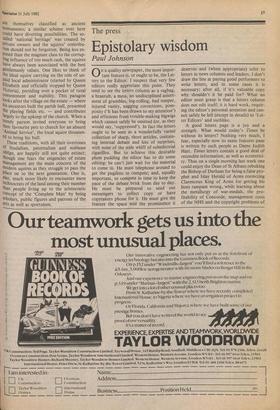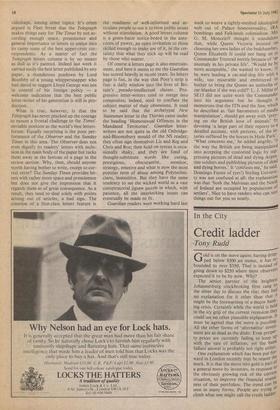The press
Epistolary wisdom
Paul Johnson
On a quality newspaper, the most impor- tant feature is, or ought to be, the Let- ters to the Editor. I suspect that very few editors really appreciate this point. They tend to see the letters column as a ragbag, a brantub, a mess, an undisciplined assort- ment of grumbles, log-rolling, bad temper, injured vanity, nagging corrections, pom- posity ('It has been drawn to my attention') and effusions from trouble-making bigwigs which cannot safely be omitted (or, as they would say, `suppressed'). In fact the letters ought to be seen as a wonderfully varied collection of sharp, short articles, contain- ing internal debate and lots of surprises, with none of the stale whiff of subeditorial cigarillos. But to achieve this desirable plum pudding the editor has to do some editing: he can't just wait for the material to come in. He must telephone around to get the pugilists to compete; and, equally important, to compete in time to keep the pace of the debate brisk from day to day. He must be prepared to send out messengers to collect copy or have copytakers phone for it. He must give the feature the space and the prominence it
deserves and (when appropriate) refer to letters in news columns and leaders. I don't draw the line at paying good performers to write letters, and in some cases it is necessary; after all, if it's valuable copy why shouldn't it be paid for? What an editor must grasp is that a letters column does not edit itself; it is hard work, requir- ing the editor's personal attention and can- not safely be left (except in details) to 'Let- ter Editors' and suchlike.
A good letters page is a joy and a strength. What would today's Times be without its letters? Nothing very much, I fear, especially now its main features page is written by such people as Dame Judith Hart. Times letters contain a good deal of recondite information, as well as eccentrici- ty. Thus on a single morning last week one could enjoy the Dean of St Albans rebuking the Bishop of Durham for being a false pro- phet and Islay Herald of Arms correcting Clarenceux King of Arms for getting his lions rampant wrong, while learning about the metallurgy of war-medals, the pro- fitability of Concorde, management costs of the NHS and the copyright problems of videotape, among other topics. It's often argued in Fleet Street that the Telegraph makes things easy for The Times by not ac- cording enough space, prominence and general importance to letters to entice into its camp some of the best upper-crust cor- respondents. As a matter of fact the Telegraph letters column is by no means as dull as it's painted. Indeed last week it carried easily the best letter published by any paper, a thunderous putdown by Lord Boothby of a young whippersnapper who had dared to suggest Lloyd George was not in control of his foreign policy — a welcome indication that the best public letter-writer of his generation is still in pro- duction.
What is true, however, is that the Telegraph has never plucked up the courage to mount a frontal challenge to the Times' enviable position as the world's best letters- forum. Equally surprising is the poor per- formance of the Observer and the Sunday Times in this area. The Observer does not. even dignify its readers' letters with inclu- sion in the main body of the paper but tucks them away at the bottom of a page in the review section. Why, then, should anyone worth having bother to write, except to cor- rect error? The Sunday Times provides let- ters with rather more space and prominence but does not give the impression that it regards them as of great consequence. As a result, they tend to deal solely with points arising out of articles, a bad sign. The criterion of a first-class letters feature is
the readiness of well-informed and ar- ticulate people to use it to raise public issues without stimulation. A good letters column is a green-baize notice-board in the ante- room of power, an open invitation to those skilled enough to make use of it, in the cer- tainty that what they stick up will be read by those who matter.
Of course a letters page is also entertain- ment, and here it seems to me the Guardian has scored heavily in recent years. Its letters page is fun, in the way that Posy's strip is fun: a daily window into the lives of Bri- tain's _pseudo-intellectual classes. Pro- gressive letter-writers tend to merge into composites; indeed, tend to conflate the subject matter of their obsessions. It used to be said that the archetypal New Statesman letter in the Thirties came under the heading 'Homosexual Offences in the Mandated Territories'. Guardian letter- writers are not quite in the old Oxbridge- and-Bloomsbury mould of the NS reader; they often sign themselves Liz and Reg and Chris and Roz; their hold on syntax is occa- sionally shaky, and they are fond of thought-substitute words like caring,
prestigious, obscurantist, monitor, strategy, emotive and what is now the most popular term of abuse among Polytechni- cians, insensitive. But they have the same tendency to see the wicked world as a vast conspiratorial jigsaw puzzle in which, with patience, all the interlocking issues can eventually be made to fit.
Guardian readers were working hard last week to weave a tightly-meshed ideological web out of Palace homosexuality, IRA bombings and Falklands colonialism. Mrs G. M. Moncrieff thought it scandalous that, while Queen Victoria insisted on choosing her own ladies of the bedchamber, Queen Elizabeth II could not hang on to Commander Trestrail merely because of 'all anomaly in his private life'. 'Would he be more.acceptable,' she wanted to know, 'If he were leading a cat-and-dog life with a wife, too miserable and embittered to bother to bring the Queen an umbrella or car-blanket if she was cold?' L. J. Millar of SE13 did not quite work the Commander into his argument but he thought it monstrous that the ITN and the Sun, which he described as 'fair barometers of media manipulation', should get away with ‘preY- ing on the British love of animals' bY devoting 'a large part of their reports to a detailed account, with pictures, of the in- juries suffered by the horses in Hyde Park:• 'What concerns me,' he added angrily, 'Is the way the British are being manipulated into accepting the contorted logic by suP' pressing pictures of dead and dying Argen- tine soldiers and publishing pictures of dead and dying horses.' It 'confuses me,' he said: Domingo Fuster of (yes!) Stirling Universi- ty was not confused at all: the explanation was that 'both the Malvinas and the North of Ireland are occupied by populations of settlers'. Nice to have readers who can sort things out for you so neatly.







































 Previous page
Previous page